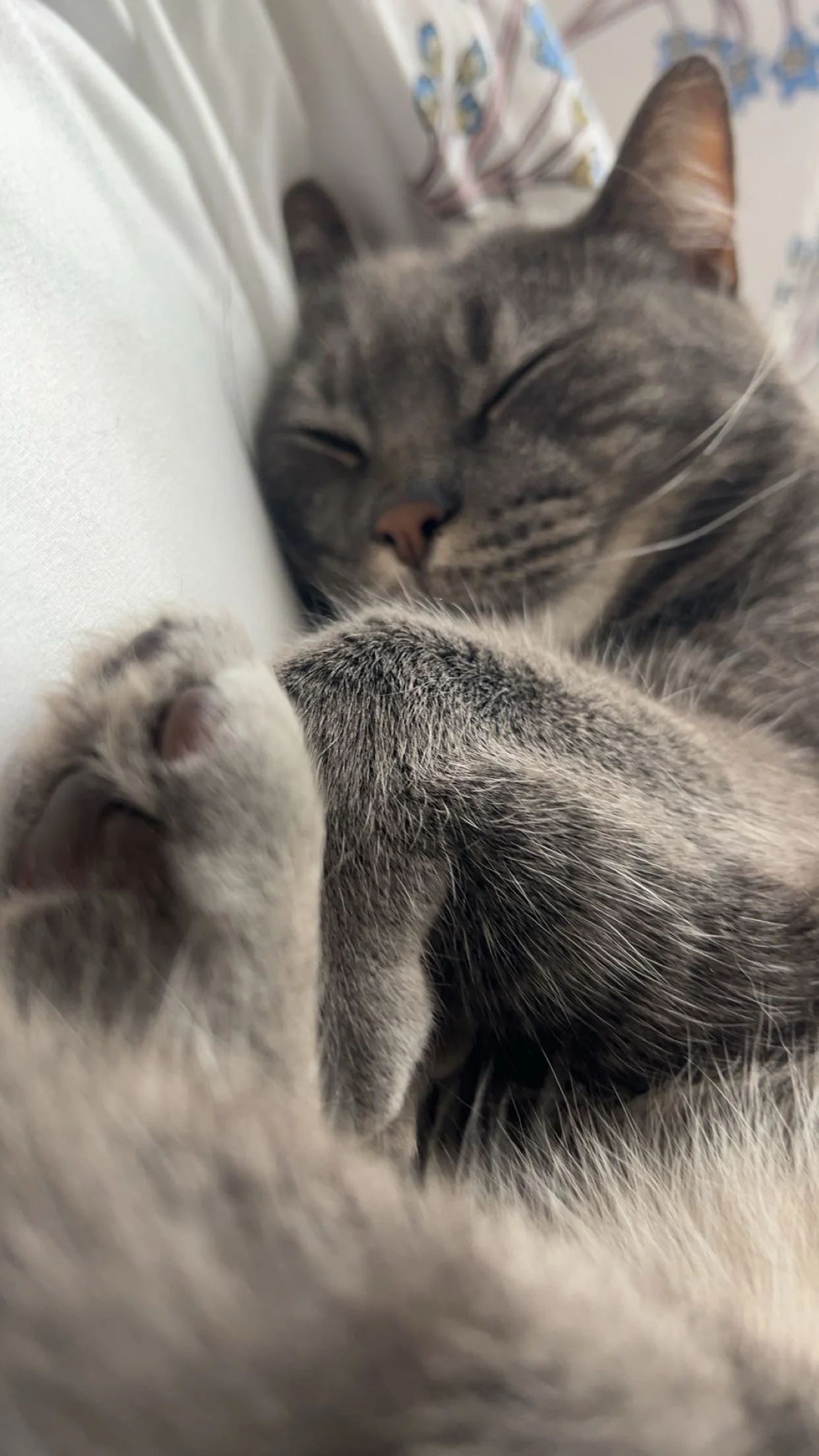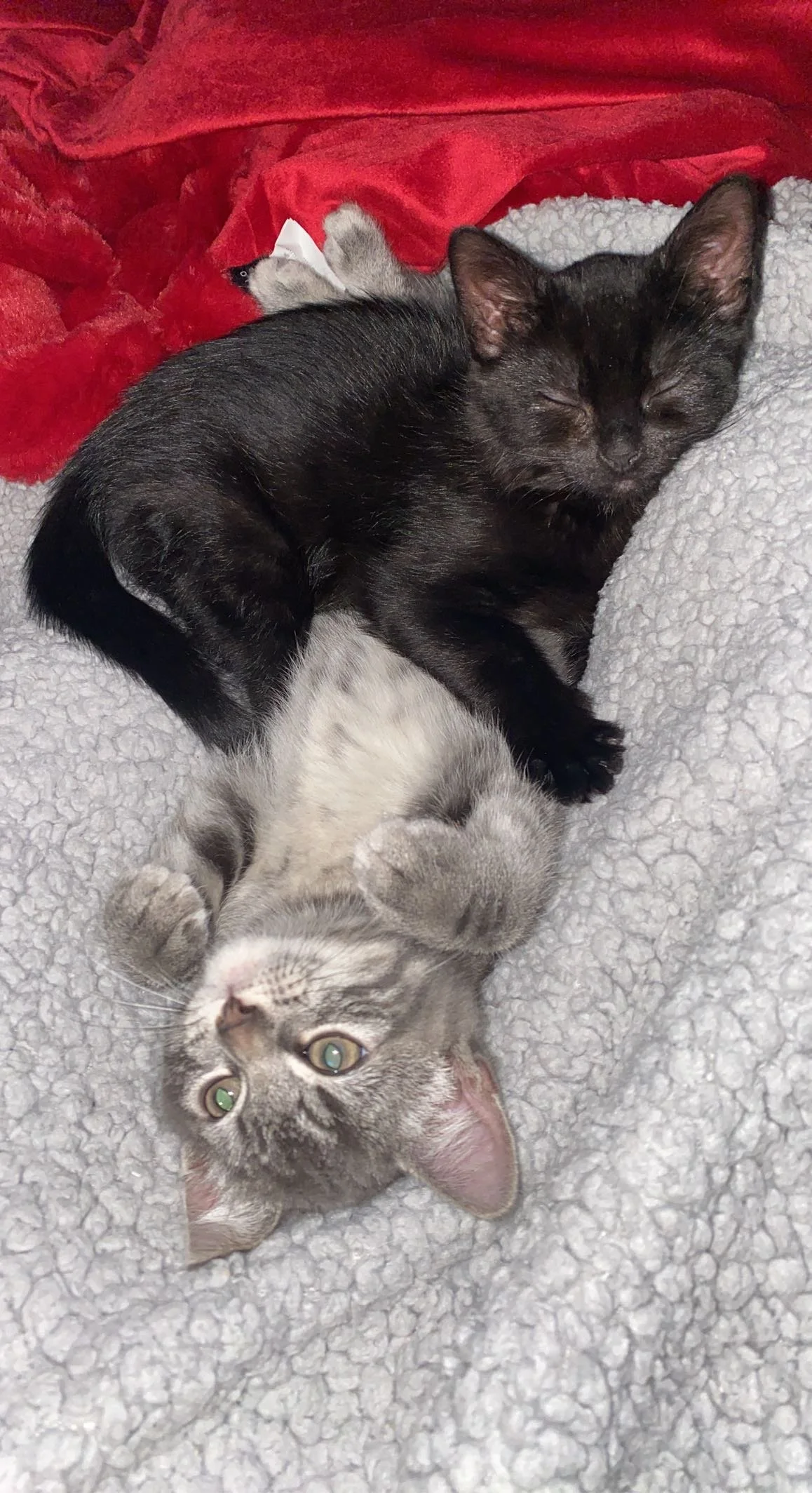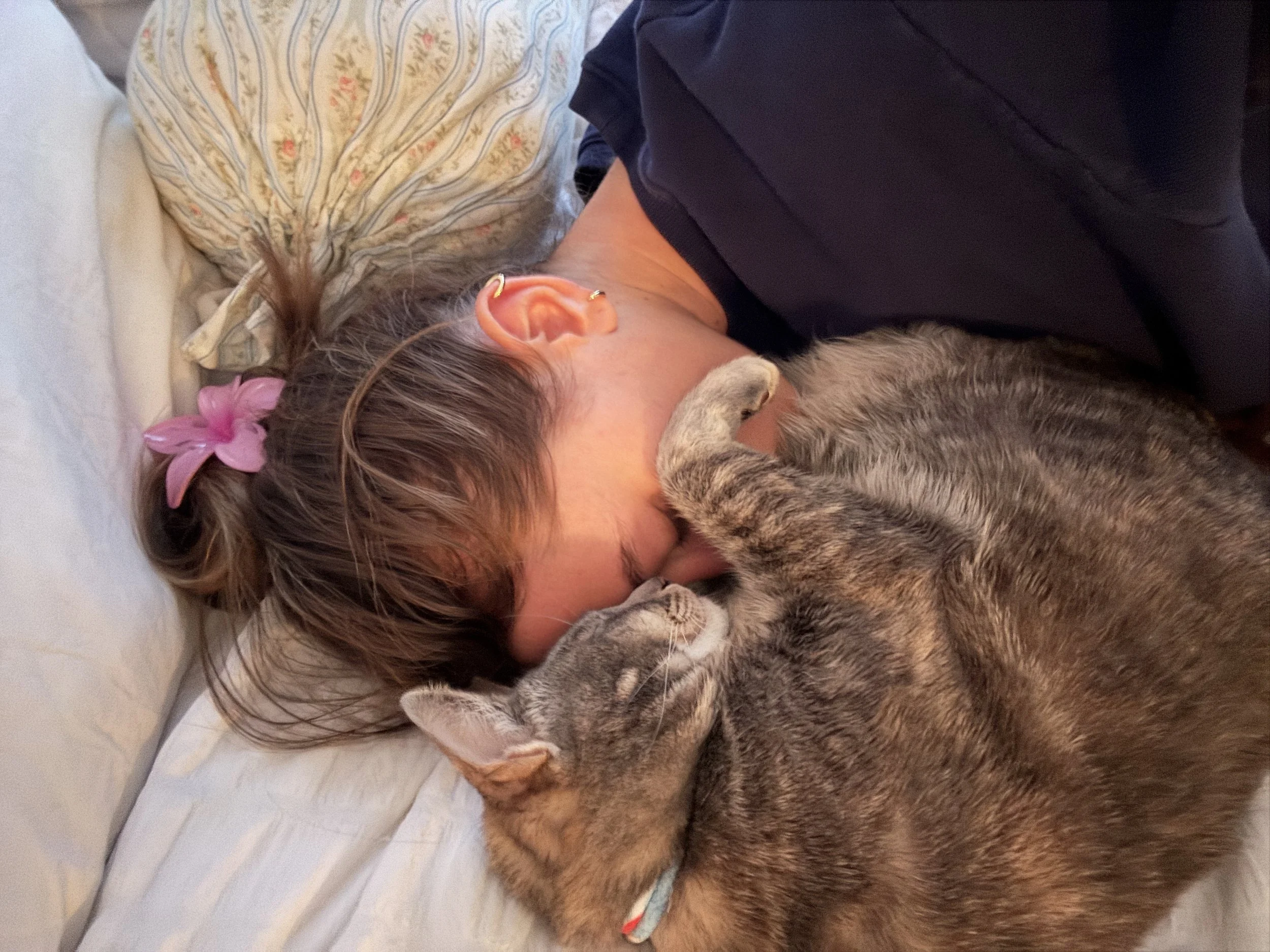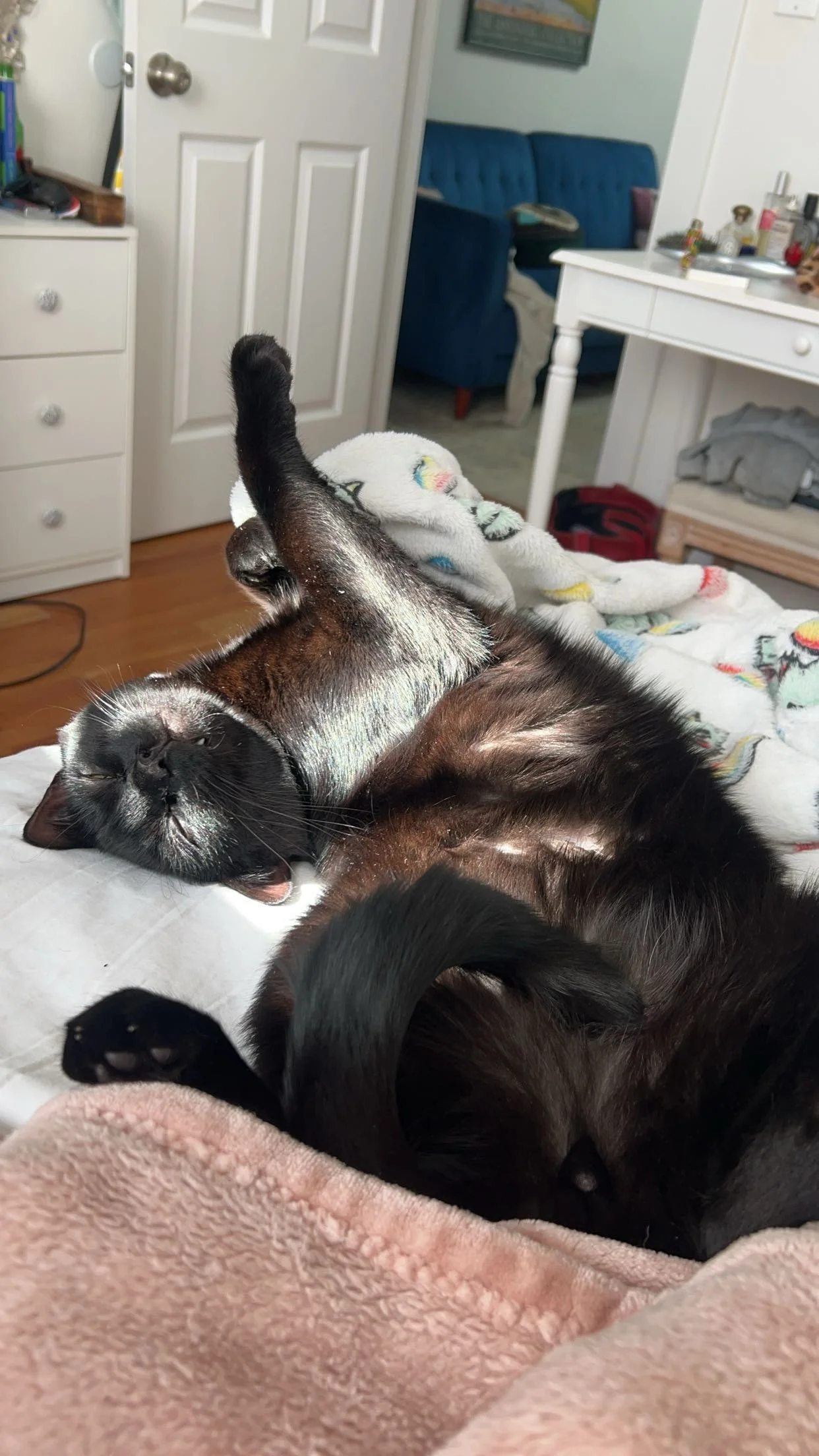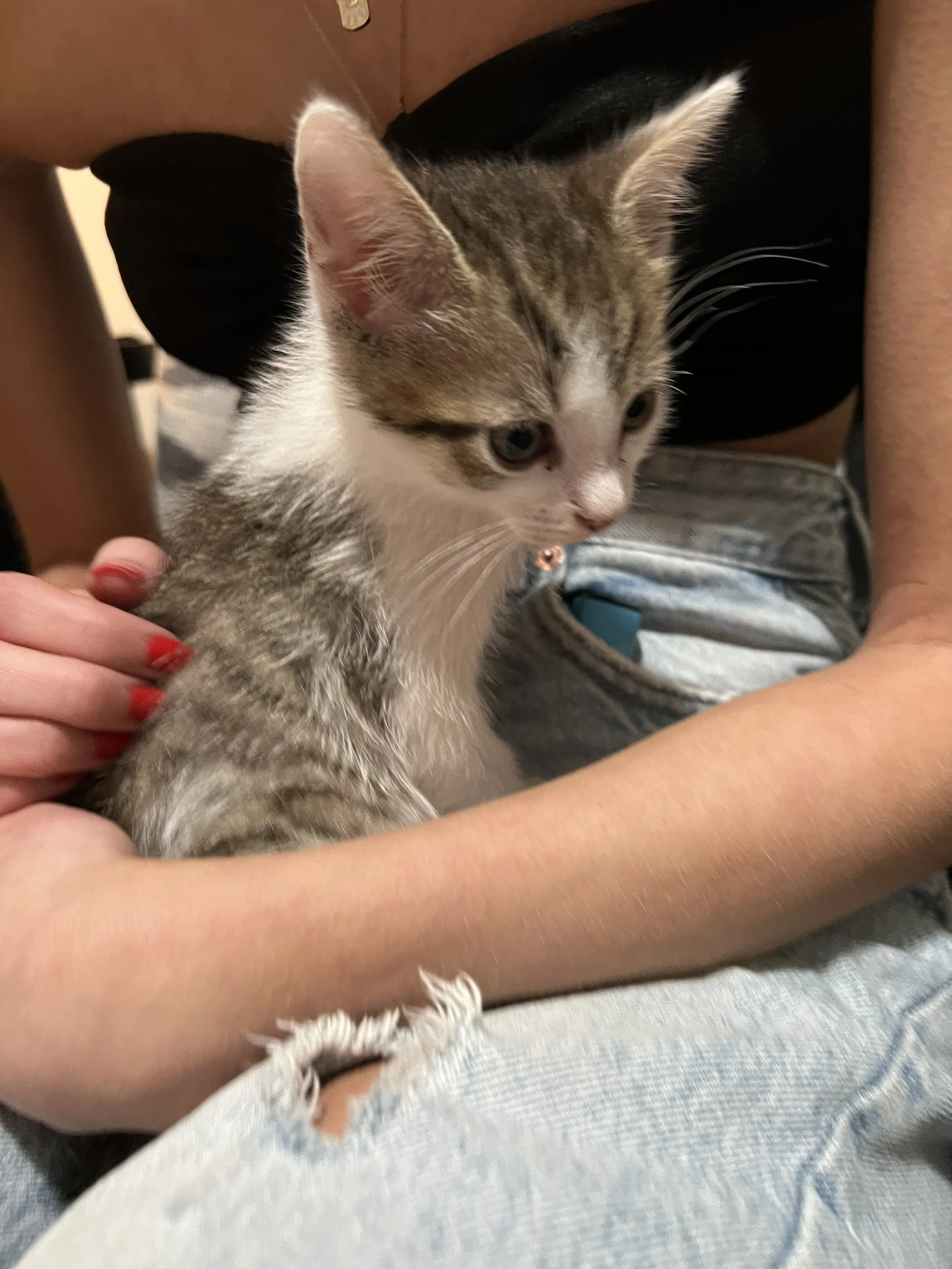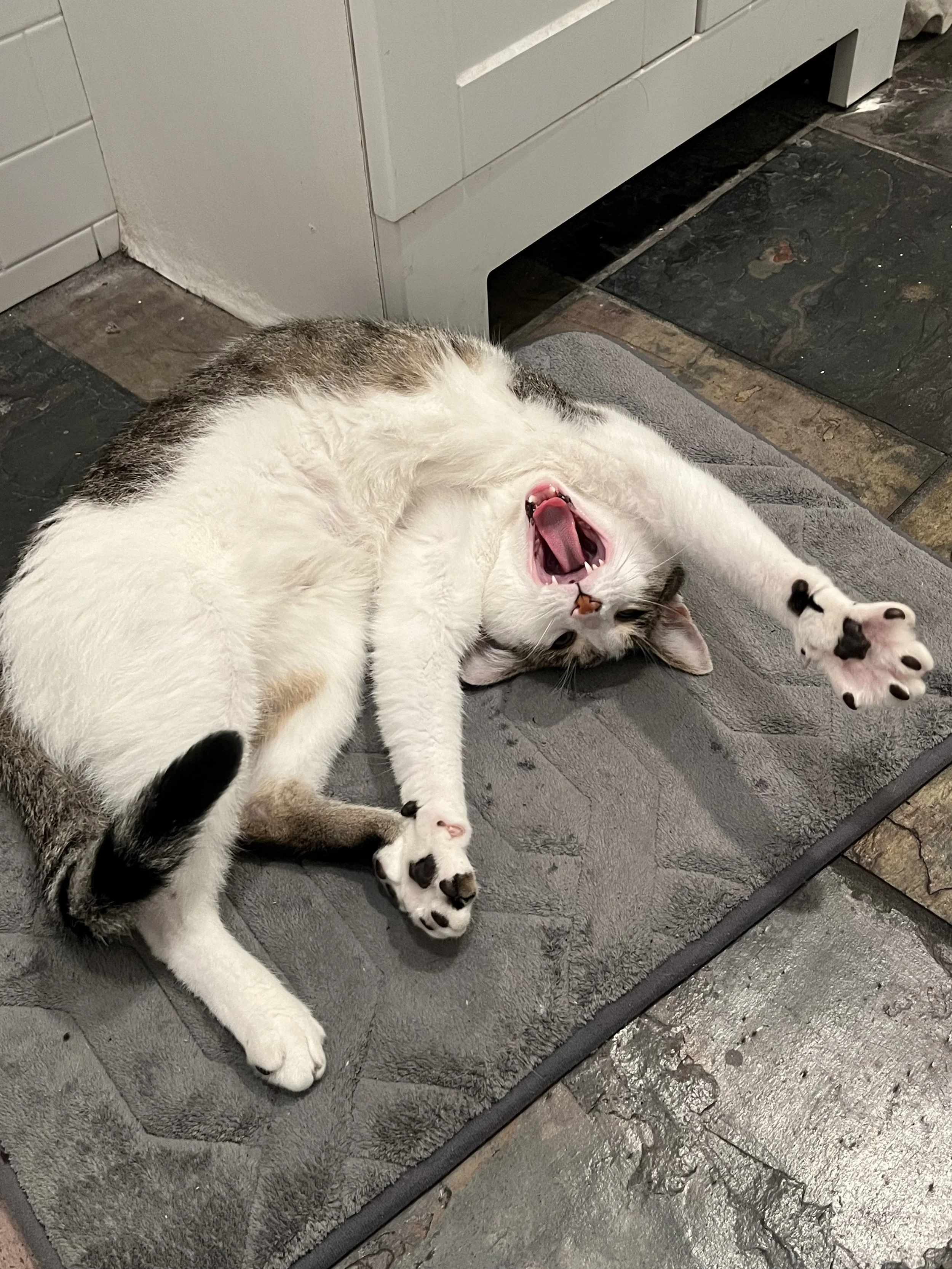“I Never Truly Feel Alone”
Word Count: 1845
By Stella McFarland
How cats help with college students’ mental health and community building amidst the loneliness epidemic.
Basil was a street cat living in an abandoned apartment complex who gave birth to kittens. Fordham senior Eva Patenaude rescued Basil during her sophomore year and hasn’t looked back since. The people living in the apartment took her kittens and left her behind. Now Basil has a new home filled with the love of four college girls. Not only does Basil live a happier life, but so does Eva.
This kind of companionship, between students and animals, is becoming more common on college campuses, especially in urban areas like New York City. Dogs are often spotlighted in conversations around emotional support animals, but cats are earning their place as important companions while students navigate the transformative period of college.
For students at city schools like Fordham University in New York City, the stress of college can feel especially intense. The city adds noise, pressure, and chaos to an already new challenge. It’s a cold, difficult, and expensive city. Add on the typical challenges of college, it’s no wonder students are dealing with high levels of stress.
Managing a new era of life with new people and a new city can be hard for young adults. New responsibilities, relationships, and homesickness can be a difficult adjustment. It’s stressful and sometimes it’s lonely.
Many Fordham students, like Eva, are finding comfort, calmness, and routine in owning a cat. A growing number of students are finding that cat companionship gives them the support they need during this life transition.
“They make me happy. They comfort me. I feel calmer when I’m around them,” says cat mom and Fordham University senior, Brett Cetnar-Garrett. Brett adopted her cats when moving into her off-campus apartment her freshman year. “My mom sent me a Facebook Marketplace post of two brother kittens who needed a home,” she says. “It felt like another step to making it feel more like home in the Bronx.”
This sense of home is difficult to find for many college students, especially when first adjusting to university life. Having a pet can transform your college house into a home.
Will Donovan lives in his college house with five other guys and their cat Monsieur. Will’s friends took in a pregnant stray cat, and she gave birth to kittens, one of them being Monsieur, whom they decided to take in. Monsieur's brother also lives at Fordham with other students. “It’s nice to wake up, and he’s always happy to see us,” says Will. “He’s like a little stuffed animal. I think it’s helped our whole house’s mental health.”
“I feel like I always have somebody there,” Eva says. “I never truly feel alone.”
Brett agrees, “You’re never completely alone. They are always there for you, no matter what. They love you unconditionally.”
Amidst a “loneliness epidemic” and in a city as high-stress as New York, that is no small thing. Social connection is vital not only for emotional health but for individual and public health as well. According to the U.S. Surgeon General’s 2023 advisory on social connection, lacking strong social relationships poses a significant health risk, comparable to smoking up to 15 cigarettes a day. Loneliness has been linked to increased risk of heart disease, stroke, dementia, depression, and anxiety.
For college students, social connection is especially important as young adults are among the groups most at risk for social disconnection, due to transitions like moving away from home and adjusting to new environments. The lingering impacts of the COVID-19 pandemic have increased this struggle as many students have spent formative years online and socially isolated.
Meaningful connections can feel difficult to attain, especially in busy and fast-paced cities like New York. Having a cat that provides consistent support, affection, and companionship can help fight against these feelings of isolation.
“I have always grown up with cats, they are such comforting and grounding animals,” says Brett. “If you’re feeling stressed out, they can sense that, and they will come up to you and spend a little extra time with you.”
Eva describes coming home after a long day of class and work to find Basil waiting for her. “She’s so sweet and cuddly that I can use her as a stress ball and cuddle with her,” she laughs.
"When I’m stressed out and working on an assignment late at night, they'll usually stay up with me and sit with me,” Brett says.
Having cats is not all about responsibility, and their benefits go beyond emotional support. Cats are amazing at something students crave: connection. There is a large cat community at Fordham University, from stray cats on campus to many students’ pets.
“Having a cat is such a great talking point,” Eva says. “People always want to come by and meet her.”
Brett has experienced this firsthand. “We got the cats our freshman year, so people definitely took our apartment as a place to come hang out and be with animals when they don’t have them because they’re not at home," Brett adds. “It’s fun to have a miniature family away from your real family.”
“It’s helped us as roommates get closer because he’s our little pet. All six of us almost have like our little child,” says Will.
“The six of us hang out together a lot, and Monsieur is always there with us. He’s a very social cat,” Will continues. “He likes the chaos of living with six guys. He kind of took on the personality of our house.”
Dr. Rachel Annunziato, a clinical psychologist and professor at Fordham University, studies the transition to adulthood and isn’t surprised that students are looking to cats for support. “College is this period of intense change,” she explains. “There’s this shift into more independent living—more autonomy, decision making, and navigating whole systems.”
In a city that never slows down, cats offer stillness, sweetness, and a constant reminder that you’re okay. “There’s not much nature in the Bronx so its nice to have a pet to hang out with,” says Will.
Dr. Annunziato notes that cats are a good fit for city and college life. “Cats are lower maintenance than other pets. There’s a lovely happy medium where it’s feasible in a college environment to take care of a cat. You get the benefits without it being burdensome.”
It’s 5:23 pm, and Will shares, “Monsieur has been sleeping on his hammock in the window since 8 am this morning.” When Monsieur isn’t sleeping, he’s playful and energetic. “Monsieur likes to play a lot, he’ll attack our legs. When we have people over, he’ll always come lay in the middle of the floor with everyone.”
Cats are independent animals and take a lot less time and space to take care of in comparison to dogs, who need constant walks and attention. Cats are typically sleeping, cuddling, playing, or exploring. Yet, they are always there to provide comfort and companionship.
“As you’re learning to take care of yourself, you have something else that you’re taking care of too,” Dr. Annunziato explains. “And that can be so gratifying and such a good learning experience. It’s empowering. This feeling of ‘I’ve got this.’”
"If you're able to take care of something every day, then you are at least doing something productive in your day, and that can keep you going,” says Brett.
“It’s nice to have a pet in the house, a living being you’re taking care of,” Will says.
The experience of caring for a pet while caring for oneself is a great learning experience in college. It encourages you to build skills that are important to have in your adulthood. Owning a cat in college gives students a sense of joy, empowerment, and responsibility.
“They’re completely dependent on you and we’re dependent on them too,” says Brett. There’s a reciprocal relationship that exists between cats and their owners. Cats are happy to be in a loving, healthy home with food and water, and young adults are happy to have a pet to cope with the stress that life changes bring.
Caring for a cat isn’t just about day-to-day tasks, it’s about building habits that will last well beyond your college years. “College is a good time to get a cat because it teaches you responsibility,” Eva says. “It teaches you budgeting, compassion, and scheduling. It teaches you how to care for and love another little life form.”
It’s not always easy, Basil came with her own challenges. “She was sick when we first got her,” Eva shares. “Financially, that was tough, but once she got better, it’s been relatively low-cost.”
There’s also planning needed for traveling and breaks, which is frequent for many students and definitely important to consider when thinking about adopting a cat. Brett has taken Milo and Toby across the country to her mom’s house in Arizona. “They’ve been in planes, trains, boats, and cars,” she says.
Basil’s been on more road trips than most students. “She’s kind of a world traveler,” Eva says. “She’s gone from Virginia to Connecticut, Connecticut to Rhode Island, Rhode Island to New York.”
Dr. Annunziato points out that planning for breaks is great practice. “That kind of planning extrapolates to other kinds of planning you’re starting to do in young adulthood.”
“Cats make a house a home. Sometimes the city can feel overwhelming but to come home to a little sweet cat, makes everything feel sweet.”
“It feels like somebody that I don’t know that well is kind of familiar with me because they get to know Basil.” In college, especially in a big city where loneliness can creep in, that kind of community-building is priceless.
"There's kind of like this cat community at Fordham, so we kind of all take care of each other,” Brett says.
Eva, Brett, and Will all agree that having a cat is great for building connections among students at Fordham. “There are so many people with cats at Fordham, and everyone likes to bond over their cats. And everyone loves Monsieur,” says Will.
"More people know the cats than us,” Brett jokes. “It’s such a social thing, so many people have cats here.” Fordham University’s cat community runs strong. Most students are excited to meet a friendly pet when they are far away from their own pets at home.
The transition out of college can be just as nerve-wracking as the first year moving into college. Graduation brings on many feelings of uncertainty. Students feel as if they just moved into college and suddenly everyone’s asking, “what’s next?”
According to Dr. Annunziato, pets can be grounding during this phase of uncertainty and change. “Cats can be a ‘piece of continuity’ in the midst of all of that change,” she says. “They are a nice extension of your time at college. You’ve grown together.”
For students like Eva, Brett, and Will, their cats have grown up with them and will continue to grow alongside them for many years following graduation.
“I would 1000% recommend other students get a cat. It’s a sort of companionship that will last you, starting in college, throughout your life,” Eva says.

